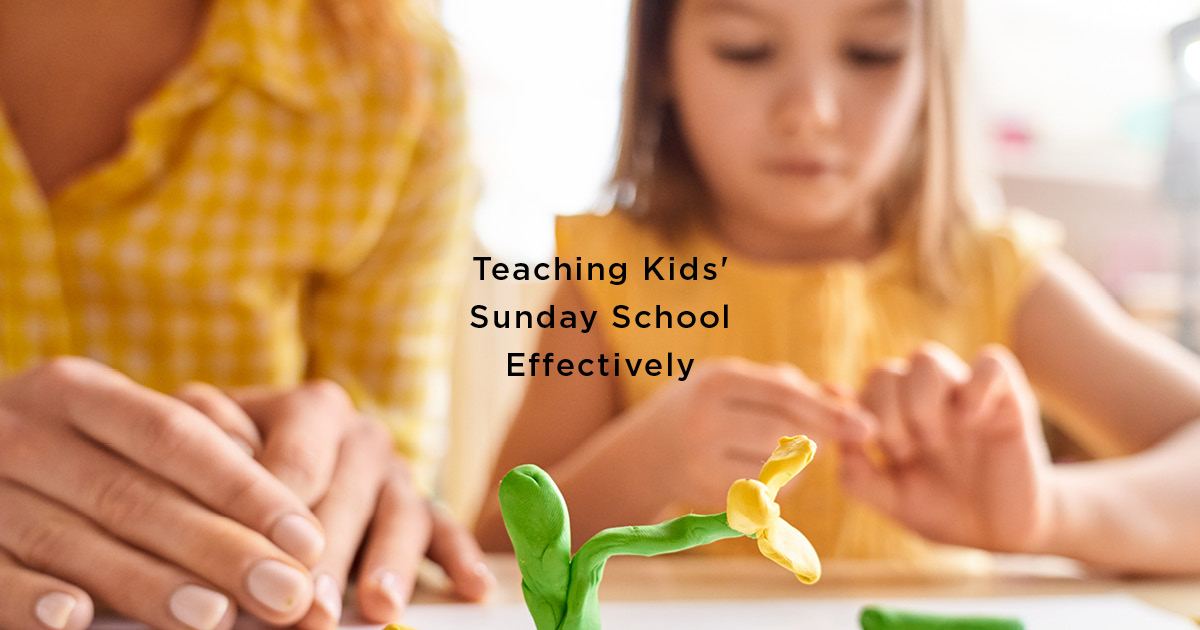
As churches have reopened since the height of the Covid-19 pandemic, many are reassessing which activities to resurrect and which to drop, especially in kids’ ministry. For many, this is a time to restart afresh. Teachers and volunteers have a chance to ask “How do I teach Sunday school effectively?” instead of the usual question, “What are we doing next?”
The following ideas consider this question to help Sunday school teachers grow as disciple-makers.
Reflecting on recent research about how faith is handed down through generations, Trevin Wax notes: “Regardless of whether they realize it, parents are the strongest force shaping the religious futures of their kids.”
There’s a lot you can do during the hour or so you spend with kids each Sunday—but there’s also a lot you can’t! Finding ways to involve parents helps ensure that your Sunday School lessons are carried through during the week, imprinting them deeper on young hearts.
To involve parents, you might provide them with a follow-up worksheet or talking points to engage with their kids during the week. An outline of your lesson plan and key messages for parents can also help them know how to ask kids “What did you think of X?” instead of the vague “How was Sunday school?”
To teach kids effectively, it’s important to recognize that every child learns differently. Some kids are auditory learners who do well listening to a story; others may be tactile learners who find truths easier to grasp when they color, craft, or play something related to the lesson. Visual students might do well with illustrations or videos that supplement the teaching.
Finding ways to involve parents helps ensure that your Sunday School lessons are carried through during the week, imprinting them deeper on young hearts.
Many different books or curriculums offer ideas or supplemental material to help encompass a variety of learning styles. Likewise, with many of our children’s books we offer free downloads of lesson plans, coloring sheets, read-through videos, and more.
Author and researcher Ben Trueblood says one of the reasons young adults leave the church is that “there simply isn’t an understanding of what the church is, how it functions in their life, and how they are meant to function as part of it.” If kids aren’t part of regular church life from a young age, it can be hard for them to see how they will fit into the body of Christ when they’re grown.
Sunday school is a great place to normalize spiritual conversations, asking questions about God and the Bible and praying together. This sets kids up to settle into small groups and Bible studies later in life, as well as to understand that faith is meant to be lived out in community.
Outside of Sunday school and church, one of the primary ways Christians of all ages engage with God is through his word. When you incorporate opening the Bible into Sunday school with kids, they learn this is something they can do themselves—at home, at school, anywhere!
Sunday school is a great place to normalize spiritual conversations, asking questions about God and the Bible and praying together.
With very young kids, it’s helpful to have a children’s Bible on hand and to model reading from it directly. Even if you’re reading a story about the Bible, it’s helpful to flip open the Bible itself to repeat a particular line, demonstrating the importance of God’s word.
Older kids can read along in their Bibles, or even practice reading out loud. Practicing finding passages in the Bible and teaching an understanding of different genres in the Bible also help kids learn to turn to the Bible.
For a gospel-centered Sunday School curriculum that encourages kids to open up the Bible and incorporates different learning styles as well as tips for answering tricky questions and more, check out The Garden, the Curtain and the Cross Sunday School Lessons. This curriculum for 3-5s, 5-8s, and 8-12s includes six sessions spanning Genesis to Revelation.
.jpg)